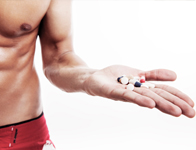RESEARCH identifying adverse events after the use of some sports supplements has lifted the lid on the “Pandora’s box of community infiltration” by the sports supplement industry, according to Dr David Hughes, chief medical officer for the Australian Institute of Sport.
Dr Hughes was commenting on a letter in the MJA in which researchers at the NSW Poisons Information Centre reported on the number of adverse events occurring after recreational or therapeutic use of products containing 1,3-dimethylamylamine (DMAA). (1)
The researchers identified 50 adverse events in adults over a period of 3.5 years, ranging from nausea and vomiting (25 cases) and tachycardia (21) to anxiety and agitation (7) and chest pain (2). The median recorded age of adults exposed to DMAA was 20 years.
Although DMAA was banned by the Therapeutic Goods Administration in August last year, products containing the substance are still available over the internet. (2)
Dr Hughes said the increasing use of sports supplements by the general public was a victory of marketing over science.
“The supplements industry is a financial behemoth with little regulatory oversight. Even in the high-performance sports environment where athletes should have access to high level, evidence-based advice, there is evidence of improper use of supplements. Supplement products frequently contain cocktails of multiple ingredients”, said Dr Hughes, who is also vice-president of the Australasian College of Sports Physicians.
He said it was clear that many individuals took supplements with little understanding of the questionable benefits or potential risks. His concerns extended beyond supplements containing DMAA to sports supplements generally and to sports drinks.
“There are very few indications for ingestion of sports drinks by schoolchildren. There is no role for sports supplementation in schoolchildren participating in single-episode sporting events such as a game of netball, basketball, cricket or football.
“The use of supplements by recreational gymnasium attendees is farcical and potentially harmful. These individuals have no need of supplements as long as they have a reasonably balanced diet.”
Dr Peter Larkins, a specialist sport and exercise physician, said the adverse reactions identified in the research were likely to be the “tip of the iceberg”.
“[These figures] don’t represent real use — they just represent the [consumers] we know ended up in contact with a hospital”, he said. “A lot of people who end up with headache, agitation, palpitations or insomnia are not necessarily going to go to hospital; they are going to just feel sick for a couple of days and then get over it.”
Dr Larkins said while the use of “contaminated supplements”, or those containing DMAA or DMAA-like substances, had been a big story in sports, the use of such non-regulated supplements was far broader than the sporting community.
“We know it’s a dangerous drug, we know it’s not being used medically, we know it’s being used in inappropriate circumstances”, he said, adding that the supplements were used to boost energy or for weight loss.
He said supplements bought on the street or over the internet were unregulated and often did not detail ingredients.
“One of the things we’ve said to our athletes is that if you’re buying products that are designed to give you energy or to stop fatigue or a weight-loss product, 90% of the time they’re going to have an amphetamine product in them and that’s why you feel up or lose weight”, he said.
Dr Hughes said doctors should be alert to the use of sports supplements and their potential adverse effects in the general community.
“Questions regarding ingestion of herbal medicines or sports supplements should be included as part of the normal history-taking process. Some supplements contain high doses of ephedrine, caffeine and/or guarana, any of which can cause stimulant-related side effects, similar to the DMAA side effects reported [in the MJA letter],” he said.
The researchers wrote that further monitoring was needed to determine whether problems from illicit use of DMAA and other multi-ingredient sports supplements promoting “legal highs” had been solved by regulatory action.
1. MJA 2013: 198: 414-415
2. TGA: The TGA decision to ban DMAA, 3 August 2012

 more_vert
more_vert
While waiting in a discount chain pharmacy recently, I decided to check out the “supplements” and “natural therapies” aisle. There were hundreds – if not thousands – of products from protein powders to homeopathic “remedies”. What does AHPRA’s code of conduct say about registered pharmacists selling this stuff? The homeopathic products are even more worrying in terms of quality control or truth in advertising – how could you ever test whether a particular “remedy” no longer contains any molecules of arnica or no longer contains molecules of Nat.Mur.? (Nat. Mur. is my fave – it’s sodium chloride, Latinised and abbreviated for mystery).